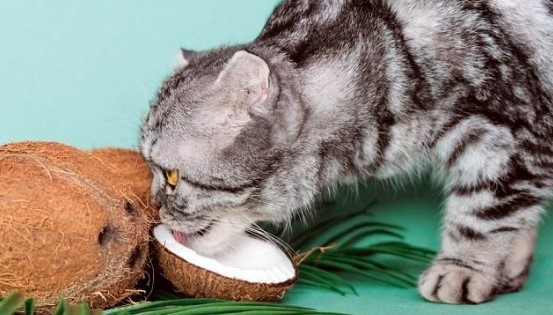Among potent fruits, coconut is the one. It contains essential nutrients that can do a lot for our body. Many watchful cat lovers may wonder, if can cats eat coconut, as they also want to serve its nutrients to them.
Luckily, coconut is a safe choice to feed your cat. Its iron and protein content maintains red blood cell production. Also, its antioxidant properties, like selenium, are a boon for cats’ health. There are more benefits of coconut for cats that are yet to be known.
Anyway, coconut can bring adverse effects to some cats if not taken in a proper quantity and way. Besides, you have to consider your cat’s health before offering it to her.
Table of Contents
All About Coconut
Coconut is a drupe, also referred to as a fruit of coconut palm. We often take coconut as a seed, fruit, and nut, although it is not a nut.
You will see coconut trees in many tropical regions and exotic locations as they are widely grown. However, coconut serves a lot of purposes in our daily life. For instance, milk, water, and flesh are something we mostly include in our diets.
In many states, you will see people add the raw white flesh part of coconut in their curries, chutney, rice, and many other dishes. Its vitamin B, iron, copper, and low-carb content can keep any person healthy from within.
Do Cats Like Coconut?
Cats, being obligate carnivores, always look for animal protein. Besides, all cats don’t have similar preferences in terms of taste. Some cats may be curious and sniff or lick coconut, while others may show no interest at all. Mostly, cats get enticed with the coconut when it is in a creamy texture. We haven’t seen any cats going crazy for a shredded coconut. So it won’t be an overstatement if we say cats don’t like coconut.
Can Cats Eat Coconut?
Cats can eat coconut in small amounts as it doesn’t have any toxic substances. The natural form of coconut flesh can bring lots of health benefits to your cat. For instance, coconut has vitamins, minerals, and dietary fibre. These nutrients will surely help in building a healthy body for your cat.
Usually, vets recommend offering coconut in moderation to cats only if they are healthy. So if your cat feels like eating coconut, you may offer it to her. But be aware of the symptoms she gives after eating coconut.
Benefits Of Eating Coconut For Cats
You can expect many health benefits if you serve coconut to your cat in a proper way and proper quantity. It is rich in protein, vitamins, and minerals, and has many micronutrients. Also, it has MCT, antiviral, and antimicrobial properties. These all can help develop your cat’s digestive system, immune system, skin, and fur.
The fibre in coconut can aid in curing constipation and the MCT can help with weight management. Again, the lauric acid in coconut will protect your cat from various infections and diseases.
Risks Of Eating Coconut For Cats
In general, coconut is a healthy fruit for cats and many other pets. It only gives side effects when you don’t consume it in the right amount or in the right way.

The medium-chain triglycerides (MCT) and high-fat content in coconut can lead to digestive issues if taken in large quantities. Besides, many cats go through hepatic lipidosis and potential pancreatitis which occurs when the liver gets filled with fats. Unfortunately, coconut is calorie-dense, so your cat may gain weight and become obese by consuming it too much.
Coconut has tough fibre that all cats can’t digest. If your cat is already suffering from digestive issues, she may get gastrointestinal blockages after eating coconut.
No wonder, some cats are allergic to coconut and plant-based nutrients. In that case, you must avoid giving coconut to them as they can manifest itching, swelling, etc.
How To Feed Coconut To Cats?
We humans eat coconut in different forms, but which form is safer for cats? Well, the best way is to feed your cat with shredded coconut. A small portion of shredded coconut is always safe for a healthy feline.
If you want, you can add a bit of coconut oil over it as it will enhance the moisture and taste. And of course, keep the treatment minimum and serve as an occasional treatment. It is because cats can’t withstand too much fat found in a huge quantity of coconut.
Can Cats Have Coconut Water, Milk, Or Oil?
Coconut water is indeed a healthy drink for all human beings. It contains potassium which may not be safe for cats if taken in a high quantity. This can cause hyperkalemia in cats. Coconut water can be somewhat safer for adult cats in moderation, but it is unsafe for kittens.
Again, coconut milk is also safe if taken in a small quantity. Cats lack enzymes, and that’s why they are lactose-intolerant. Even though coconut milk does not have as much lactose as cow’s milk, it will still pose some threat to cats’ health.

Among some safe oils for cats, coconut oil is the one. You can use it for your cats both internally and externally. Just make sure you don’t feed it in more than moderation to your cat as it is high in fats.
When Can Cats Eat Coconut?
Since coconut is high in fat and calories, you must offer a tiny amount of it to your cat. She can have a frequent consumption of coconut, like once or twice a week.
As said earlier, allergic cats or cats facing digestive issues cannot eat coconut. If your cat has any of these, then sorry to say she can’t eat coconut.
Let’s say your cat is healthy enough to eat coconut or any fruit. That doesn’t mean you can feed them to her without any tension. We prefer reassurance, so ask your veterinarian first whether coconut can be safe for your cat. If he says yes, then you are good to go.
Frequently Asked Questions: Can Cats Eat Coconut?
How much coconut should you give to your cat?
For an average breed, a ¼ tablespoon of shredded coconut is fine. Again, for a larger breed, you can go with ½ tablespoon of coconut. Lastly, for a small-sized cat, you should feed ⅛ tablespoon of coconut.
Should you give coconut milk to your cat?
A tiny amount of coconut milk shall not harm your cat. However, vets don’t recommend giving coconut milk to cats as they have a sensitive stomach.
Should you give coconut oil to your cat?
Coconut oil is safe for cats in small quantities. So far there was no record of having side effects for a cat from eating a little bit of coconut oil. You can give it to your cat by maintaining its quantity.
Final Verdict
As we can see the merits and demerits of eating coconut for cats, we still may wonder, can cats eat coconut? Yes, you can give coconut to your cat after shredding it, also the coconut should be in its natural form. You can also add half a teaspoon of coconut oil to the mixture.
We suggest offering coconut meals sparingly to cats. Avoid offering coconut to cats if you see any reaction in your cat after eating it. Again, taking it in an excessive amount can cause vomiting and diarrhoea to her. In such cases, take advice from your vet immediately.
















